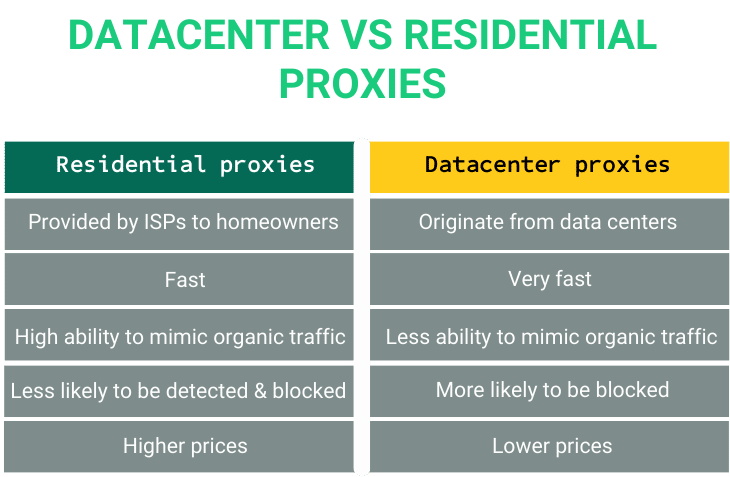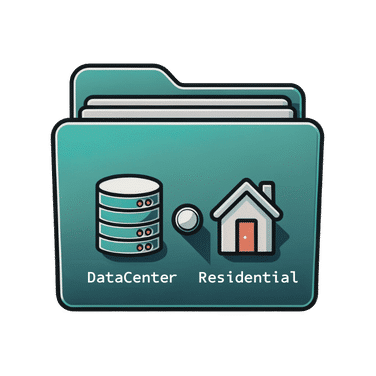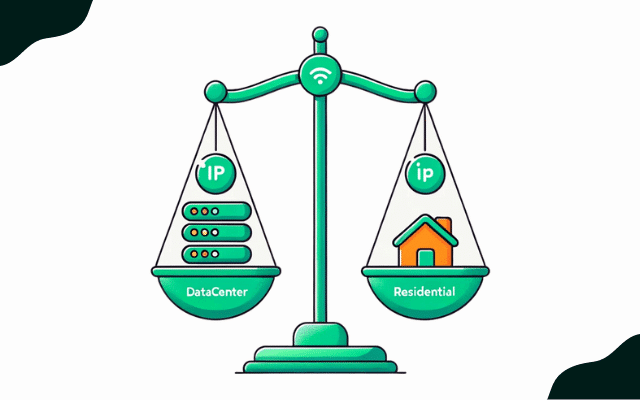So, you’re on the hunt for proxies and you know there are “Datacenter proxies“ and “Residential proxies,” but you’re not quite sure about the differences? You’re in the right place. We’ve used and compared both ourselves, and here’s what we’ve learned along the way. But first, let’s take a step back and start from the basics: what is a proxy server?
Proxies serve as intermediaries between your computer and the internet. When you use a proxy, your internet traffic goes through the proxy server before reaching its destination. This can provide anonymity, security, and even access to geographically-restricted content.
Now, on to the main comparison: datacenter vs residential proxies. These are the two most common types of proxies, and each has its own unique features and use cases.
Table of Contents
Key Differences Between Datacenter and Residential Proxies
We know how valuable your time is, so let’s cut through the technicalities and give you a straightforward comparison.

1. Origin of IPs (data centers vs residential devices)
Data Center IPs are usually generated from data centers. These IP addresses are not associated with any ISP (Internet Service Provider), but with the corporation that owns the data center instead.
This can make them more easily detectable as proxies, as they often come in sequential blocks.
On the other hand, Residential IPs are IP addresses provided by ISPs to homeowners. That’s right, the same IP address you use at home could be a residential proxy for someone else.
Because they are associated with a legitimate ISP, these proxies are much harder for websites to detect and block.
Our Experience:
For a social media automation project, our team initially tried using data center proxies to manage multiple accounts. However, within days our accounts were flagged for “inauthentic activity” and restricted.
We suspected the data center IP addresses were easy for Facebook to detect as proxies and crack down on fake accounts.
When we switched to residential proxies, the account restrictions disappeared. The authentic residential IPs allowed us to smoothly manage dozens of accounts without further issues.
2. Comparing Speed and performance
In our experience, data center proxies are known for their high speed and performance. They are directly connected to the data center’s super-fast internet connection, which makes them highly stable and swift.
However, this type of proxies doesn’t have a physical location connected to them, and platforms such as Netflix and Amazon might block these IPs if they detect them as proxies.
Residential Proxies might not offer speeds as fast as data center proxies, but they are still fast enough. Their legitimacy also compensates for this in most use cases.
Our Experience:
When web scraping a popular e-commerce site, data center proxies provided the speed and stability we needed to extract large amounts of data quickly. With residential proxies, we found the speeds to be less consistent when making a high volume of requests.
For our use case, the raw speed of data center proxies was more important than maintaining a residential appearance. We extracted over 50GB of product data flawlessly.
3. Anonymity and Mimicking Organic Traffic
Datacenter proxies offer a decent degree of anonymity, but their artificial nature somewhat hampers their capacity to mimic organic human traffic convincingly. Why so? These proxies do not correspond to an internet service provider (or ISP), making them relatively easy to spot as ‘fake’ by sophisticated website algorithms.
In contrast, residential proxies provide a higher degree of anonymity owing to their genuine IPs. These proxies are assigned by actual ISPs, making them almost indistinguishable from the organic traffic.
In our experience, websites are less likely to block or restrict these proxies as they appear to be real users.
To research competitors’ social media marketing tactics, you can use residential proxies to anonymously analyze their posts and engagement. The authentic residential IPs makes it easy for you to view their accounts without detection.
With data center proxies, you would likely get flagged for suspicious activity when thoroughly analyzing dozens of accounts. The anonymity of residential proxies is critical for mimicking normal user actions.
4. Scalability and Availability
The next imperative matter to address is the scale and availability of these proxies. How do residential and data center proxies square off in this light?
Let’s start with data center proxies.
The sheer volume of proxies that a data center can produce is unquestionably huge. Need hundreds or thousands of proxies for high-scale operations? Data centers used to be the only type to cover this. But this has changed.
Historically, residential proxies were restricted in scale compared to data centers. But with the shift from IPV4 to IPv6 and its vast ip address pool, residential proxies can now scale to meet even the largest demands. The usual availability gap has narrowed considerably.
5. Cost Considerations
Comparatively, Datacenter Proxies are cheaper than Residential Proxies. Why is that, you ask? It’s because Datacenter proxies are easier to obtain and manage, hence, financially advantageous for providers.
They are often sold in bulk which provides an economical choice, especially for businesses on a stringent budget.
On the other side, Residential Proxies are priced on the higher end. The reason being, these types of proxies are sourced from real residential IPs which make them hard to get and maintain.
They offer greater legitimacy and are less likely to be blocked, thus, the high cost. It’s like getting a premium product, you pay more for enhanced features and greater reliability.
6. Setup and Configuration
For DC proxies:
Before buying proxies and deciding on types, the setup and configuration process must be factored in so you can set your expectations correctly.
Data center proxies are generally easier and faster to setup. After the purchase, you will typically be provided with an IP address, port number, username, and password.
You can input these credentials into your preferred web scraping tool or software. Various tutorials are available for most popular tools, and V6proxies provides excellent customer support for buyers.
Note: Keep in mind that different vendors may have different setup processes, so it’s crucial to ask for specific instructions or find a guide if it’s your first time setting it up.
For Residential Proxies:
Residential proxies are often part-and-parcel with some sort of software or browser extension. When you purchase a residential proxy, you are generally buying access to a pool of IPs which are accessed via this software. You’ll need to install the software, log in, and select your desired settings, like the location of the IP you want to use.
A main advantage is that, with residential proxies, you get dynamic or periodic rotation of IPs, which means for every request or set of requests made by your scraping tool or software, a new IP address, from the pool of IPs you’ve bought, is used. This massively reduces the chance of getting blocked or banned.
TIP: For both types of proxies, always remember to test a few IPs to make sure they work correctly before launching your operations on a large scale.

Real-World Examples and Use Cases
So, you might be thinking, does it mean one type is better than the other? Well, not necessarily. It all depends on your specific needs and usage. Here are some real examples you can use to decide.
Example 1: Price Trackers
For a price comparison and tracking project, we recommend datacenter proxies to quickly scrape and extract pricing data from thousands of ecommerce sites. The speed and scalability were perfect for this large-scale web scraping use case.
Example 2: Automating Social Media
When managing multiple social media accounts, residential proxies are the type you should use to automate posting and engagement seamlessly without platform restrictions.
Example 3: Copping Sneakers
When trying to cop hyped sneaker releases, residential proxies are essential for appearing like a normal user to the retailer’s website. With data center proxies, You would get instantly blocked or flagged for bot-like activity.
Before You Decide
Remember that both types have pros and cons so weigh your options carefully based on your needs, then decide.
For sensitive tasks or those requiring high levels of anonymity, like managing multiple social media accounts or scraping sensitive data, residential proxies can serve you well. For tasks demanding high speed, data center proxies might be a better choice.

